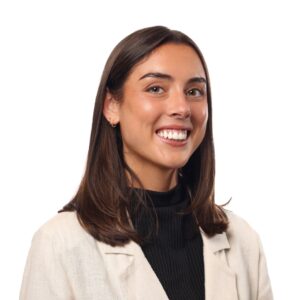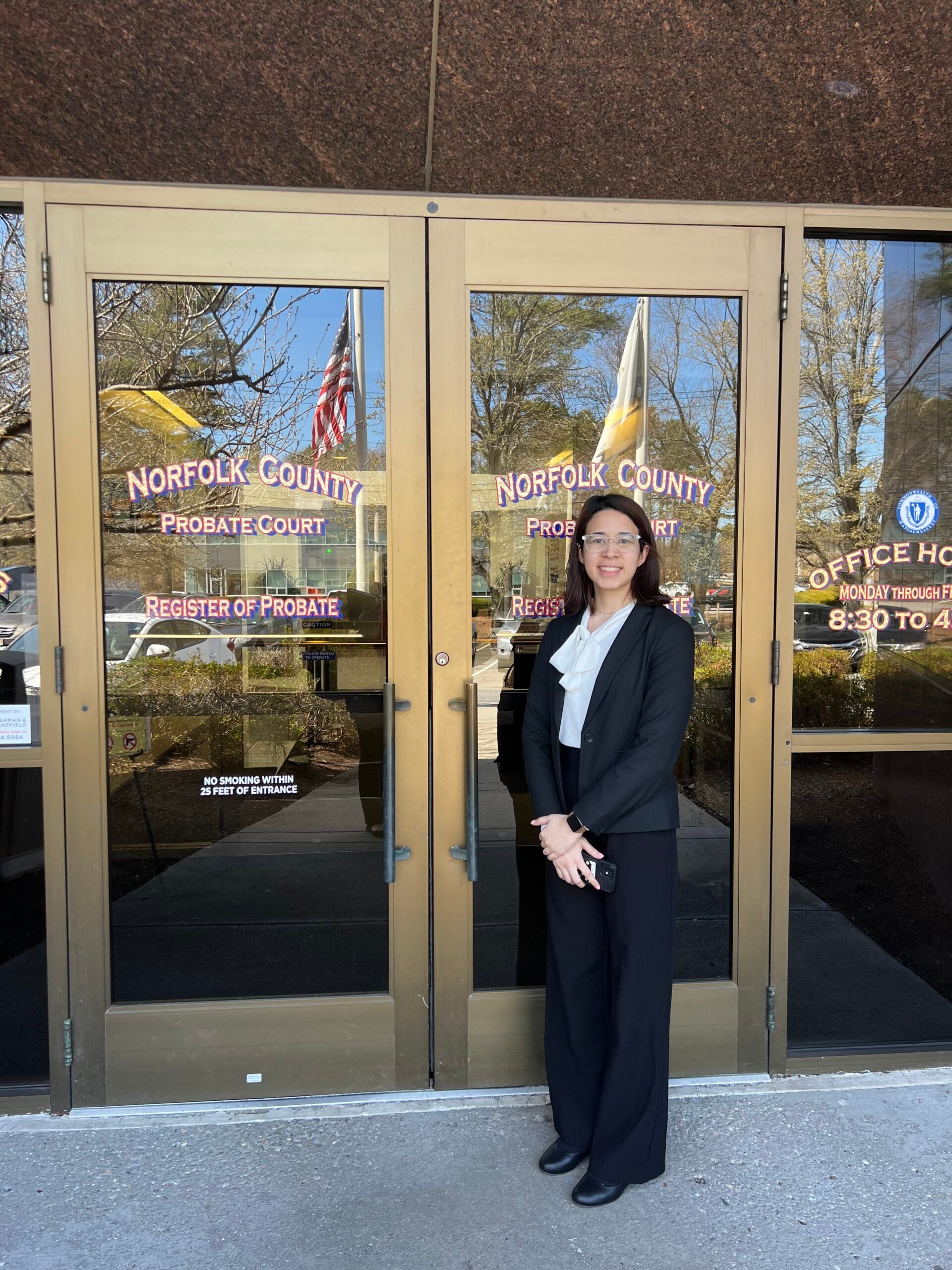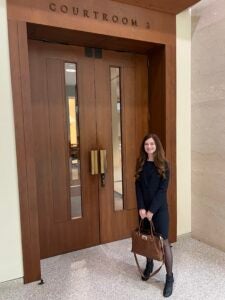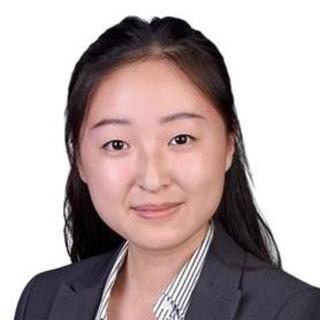By Elaine McArdle
Via LSC Blog
There are few things more devastating to a parent than having a child taken from them by the government. For Emma LoMastro ’25, helping parents fight unfounded allegations of abuse and neglect that could lead to losing custody and other serious consequences is the highlight of her Harvard Law School education.
Focused on becoming a litigator, LoMastro was eager to start representing real clients in court as soon as possible. For that reason—and because of her passion for helping people in need—she enrolled as a 2L in the Family Justice Clinic (FJC) at the WilmerHale Legal Services Center in the Jamaica Plain neighborhood in Boston.

Within a week at the clinic, LoMastro stood in administrative court at a “fair hearing” arguing that a finding of neglect against her client by the Massachusetts Department of Children and Families (DCF) was unfounded and should be overturned. Under the supervision of Marianna Yang, a practicing attorney and clinical instructor, LoMastro was responsible for and handled direct examination of all witnesses and the closing arguments.
“We think the DCF investigation was not very thorough, and I think we were able to show that,” says LoMastro, whose experience was so invaluable personally and professionally that she’s returning to FJC in Fall 2024. She and her client are awaiting a decision, “but I think our chances are pretty good,” she adds.
For more than 40 years, the family practice clinic, one of six clinics at LSC, has handled a variety of family-law matters for pro bono clients, including divorces, paternity cases, custody issues, and restraining orders for survivors of intimate partner violence. Over the decades, the clinic has evolved to meet community needs, embrace developing areas of law, and foster student innovation. In fall 2023, to meet a yawning gap in legal aid for indigent families facing DCF investigations, it added a new focus in the emerging field of early family defense.
“Early family defense is civil rights work with constitutional rights at stake,” explains Rebecca Greening, who, with Yang, is one of FJC’s two clinical instructors. HLS, including FJC and the Harvard Legal Aid Bureau, is in the vanguard of this area of the law, along with several other law schools, especially NYU, where Martin Guggenheim was an early leader. As Greening notes, “We offer an opportunity for students to be experimental and figure out legal advocacy in this space.”
The murder of George Floyd by Minneapolis police in 2020 and the resulting national uprising highlighted the problem of over-policing in the US; state involvement in the family lives of marginalized communities is another example, family advocates argue.
“Even in the family law sphere, these systems are based on the same flawed underlying structures seen in law enforcement. This is modern day civil rights issue, rooted in slavery, racism, classism, homophobia.”
Rebecca Greening
The stakes for families couldn’t be higher, especially for low-income and other marginalized communities. Poverty is often misinterpreted by child welfare investigators as parental neglect, and one in three children in the US will be part of a child welfare investigation by age 18, according to a 2022 study by Human Rights Watch and the ACLU. Black families are nearly twice as likely to be investigated and have their children taken away as white families, it found.
In Massachusetts, almost half of DCF determinations of abuse or neglect, including those against foster parents and daycare providers, are overturned on administrative appeal. But many parents and caretakers don’t know they have a right to appeal nor do they understand that a finding of abuse or neglect makes it easier for the state to remove a child from the home or for someone else to get custody. Even if a parent wants to appeal, many are not able to afford a lawyer. The clinic doesn’t handle care and protection cases, where the state seeks to remove a child from their caretakers, but instead focuses on earlier stages of the DCF process, when indigent parents are not entitled to a court-appointed lawyer and DCF does not provide a Miranda-type warning informing the parents of their rights.

Another recent case illustrates how poverty is often leveraged against parents who have no resources, and how LSC’s advocacy got the state to back off. With no permanent place to live, a young mother who’d grown up in foster care herself was bouncing among friends’ homes and shelters. Even though there were no allegations of abuse or neglect, DCF decided her child was at risk and tried to remove the child. “It was a poverty-based allegation. They were trying to bully this young mother to take her child away,” says Greening. At the point that FJC got involved, the frightened mother was on the run from the state. Julia Devanthéry, director of LSC’s Housing Justice for Survivors Project, connected FJC with a housing advocate who found a shelter for the mother and child. “That stabilized the situation and DCF totally backtracked,” Greening says.
“We don’t take on clients that we think actually neglect their children. We think that most people don’t, that there’s sort of a misunderstanding with the courts and how these things are investigated, especially on the DCF end. They don’t give a lot of parents the benefit of the doubt. We’re definitely filling an important need.”
Emma LoMastro ’25
And for students interested in impact litigation, the cases provide an excellent foundation, the clinic’s students and instructors say. “Through the lens of independent representation, we are getting a window into systemic oppression and the reality of the family-policing state being an extension of the carceral state,” Greening says. Students interested in criminal defense “should know about family policing as there is a lot of intersectionality” between the fields, she emphasizes.
“This is an opportunity for students to make an impact in movement lawyering and steer the development of the field to elevate the voice of the community and systems- impacted parents.”
Marianna Yang

The enormous power of the state over families—and the consequences of a neglect finding—were glaring in a case for which clinical students Madylan Womack ’25 and Hadia Ahsan ’25 teamed up. Their client had worked for years in childcare, a career she loved, until one day, without warning, she was fired. It turned out that seven years earlier, DCF made a finding of child neglect against her related to an incident from when she worked in a daycare and was intervening in an unsafe situation with children. She didn’t know she could appeal and was provided no notice the finding existed or could impact her. The finding made it impossible for her to secure employment in her field and also had collateral impacts on her home life, as she was unable to go on school field trips or volunteer in her own children’s classrooms when a background check included DCF findings.
Womack and Ahsan handled every aspect of the fair hearing, from tracking down witnesses to preparing their client to testify to examining witnesses. Because the neglect finding was so long ago, “It was quite difficult to get any reasoning on why it happened,” says Womack, so it “was really important for her to have someone advocate for her and challenge that decision.” They currently are awaiting the decision.
Ahsan says she not only developed litigation skills but appreciated the discussions in the weekly seminar that’s part of the clinic, where Yang and Greening “really encourage thinking about big-picture ideas” about the system. Through the seminar and her own experience,
Womack says she came to see DCF as “making a lot of very loaded value judgments about childcare and what the life of a family should look like. There’s a lot of punishing folks for living in poverty and circumstances entirely out of their control.”

Like LoMastro, Xinyi Wan ’25 came to HLS to become a litigator and chose FJC for that reason. In her first semester in the clinic, in fall 2023, she negotiated a divorce settlement and helped a survivor of intimate partner violence obtain a restraining order. Wan returned to the clinic in the spring semester as an advanced clinical student so that she could experience appellate practice. She handled two cases on appeal, including one where she represented a mother against DCF in an effort to challenge a termination of her parental rights. “Now I’m more confident I can do appellate-level work,” says Wan, who as a result plans a career as an appellate lawyer.
And there are other benefits to FJC including being part of the storied Legal Services Center, which Ahsan describes as “a great community,” with frequent lunch and other events that bond students and instructors across the six clinics. Sited in the heart of the Jamaica Plain since its beginnings, LSC succeeds in its “goal to be part of community,” she adds. As one example, this year FJC students co-designed and presented Know Your Rights trainings for the community about early family defense.
LoMastro took the clinic for five credits, which equates to 20 hours of work per week, and says Yang insists students not go over their work commitment no matter how eager they are to do so. As for the commute, LoMastro wanted “to get into Boston and feel like a working adult,” and the LSC-campus shuttle and $600 per student transportation subsidy that LSC offers each semester facilitated her ability to do community-based work of this kind.
“The clinic is really perfect for me, and I love it so much I’m doing an advanced clinical here next semester,” LoMastro says. “I’m a big family-justice person, so I’ll be back.”
Filed in: Clinical Spotlight
Contact Office of Clinical and Pro Bono Programs
Website:
hls.harvard.edu/clinics
Email:
clinical@law.harvard.edu